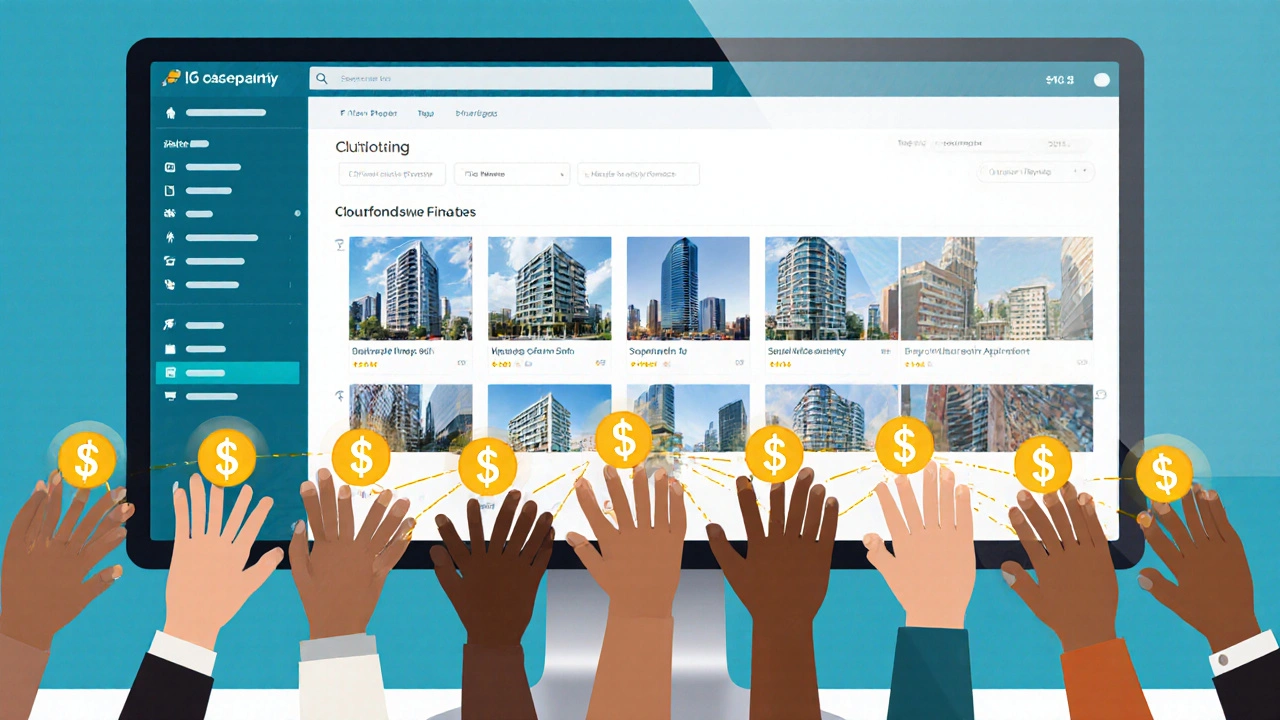Real Estate Crowdfunding Return Calculator
Projected Returns
Risk Warning
Investment in real estate crowdfunding is subject to significant risk. You could lose your entire investment.
Minimum investment is $500. This calculator assumes:
- Equity: 8-15% IRR over holding period
- Debt: 5-12% annual interest
- Typical holding periods: 3-7 years
When you hear real estate crowdfunding, you might wonder if it’s a gimmick or a legit way to diversify your portfolio. Real estate crowdfunding is a method of pooling investors’ money through online platforms to fund property projects, giving participants equity or debt stakes in residential, commercial or mixed‑use assets. This model blends the reach of crowdfunding with the stability of real‑estate assets, opening a door that used to be locked for most people.
Key Takeaways
- Real estate crowdfunding lets you invest in property with as little as $500.
- Two main structures exist: equity (ownership) and debt (loan).
- Platforms are regulated, but you still need to vet each deal carefully.
- Benefits include diversification, passive income and access to institutional‑grade projects.
- Risks involve illiquidity, project failure and platform solvency.
How Real Estate Crowdfunding Works
- Choose a vetted crowdfunding platform that matches your risk tolerance.
- Complete a brief KYC (Know‑Your‑Customer) check; most platforms require an email, ID and bank details.
- Browse listed projects - each will show location, property type, projected returns and the funding structure (equity or debt).
- Decide how much to commit. Minimums range from $500 to $10,000, depending on the offering.
- Fund the investment through ACH, wire or a supported payment method. Your money is held in an escrow account until the target amount is reached.
- Once funded, the platform manages the acquisition, construction or refinancing. You receive regular updates and, if applicable, quarterly cash‑flow distributions.
- When the asset is sold or refinanced, proceeds are split according to your share.
Types of Real Estate Crowdfunding
Understanding the two primary structures helps you align investments with your goals.
| Aspect | Equity Crowdfunding | Debt Crowdfunding |
|---|---|---|
| Investor Role | Partial owner of the property | Lender to the project |
| Return Source | Rental income + appreciation | Fixed interest payments |
| Risk Profile | Higher - tied to market value | Lower - senior lien priority |
| Typical Yield | 8‑15% IRR | 5‑12% annual interest |
| Exit Horizon | 3‑7 years (sale or refinance) | 1‑5 years (loan maturity) |

Key Benefits of Crowdfunding Real Estate
- Low entry barrier: You can start with a few hundred dollars, far less than buying a property outright.
- Diversification: Allocate across multiple markets, asset classes and risk tiers without buying whole buildings.
- Passive income: Most equity deals distribute quarterly cash flow; debt deals pay interest on schedule.
- Professional management: The platform partners with experienced developers and property managers, so you’re not handling day‑to‑day chores.
- Access to institutional deals: High‑quality projects that were once limited to wealthy funds are now sliced into affordable pieces.
Risks and Red Flags to Watch
Every investment carries risk, and real estate crowdfunding is no exception. Keep an eye on these warning signs:
- Illiquidity: Unlike stocks, you can’t sell your stake on an open market. Your money may be locked until the project ends.
- Project failure: Construction delays, zoning issues, or market downturns can erode returns or lead to loss of principal.
- Platform risk: If the crowdfunding site goes bankrupt, your investment could be stranded. Choose platforms with strong balance sheets and transparent custodial arrangements.
- Over‑reliance on debt: High leverage magnifies losses. Review the loan‑to‑value (LTV) ratio - keep it below 70% for comfort.
- Poor disclosure: Red flags include vague business plans, missing financial projections, or no third‑party appraisal.
Top Platforms to Consider (2025 Snapshot)
Below are four platforms that consistently rank high for transparency, deal flow and investor support.
- Fundrise - Strong emphasis on diversified REIT‑style funds; minimum $500; offers both equity and debt options.
- RealtyMogul - Focuses on commercial office and multifamily assets; accredited‑investor friendly; detailed due‑diligence packs.
- CrowdStreet - Marketplace for large‑scale commercial projects; higher minimums ($25k) but elite sponsor network.
- Groundfloor - Purely debt‑centric; short‑term loans (6‑12 months); weekly payouts; ideal for income‑seeking investors.

Regulatory Landscape in the United States
Since the JOBS Act of 2012, the Securities and Exchange Commission (SEC) has allowed non‑accredited investors to participate in crowdfunding under Regulation Crowdfunding (Reg CF). Key points:
- Annual investment limits are based on income and net worth - typically $2,200 or 5% of annual income, whichever is lower.
- Platforms must register with the SEC and be members of FINRA (Financial Industry Regulatory Authority).
- Every offering must provide a Form C disclosure, covering risks, use of proceeds, and financial statements.
- State securities laws (“Blue Sky” rules) still apply, but most platforms handle the filing for you.
International investors should watch local securities regulations, as some jurisdictions restrict participation in US‑based crowdfunded deals.
Getting Started: A Practical Checklist
- Define your goal: Are you chasing growth (equity) or steady cash flow (debt)?
- Assess risk tolerance: Use a simple questionnaire - if a 20% loss would cripple you, stay with lower‑leverage debt deals.
- Select a platform: Verify SEC registration, read user reviews, and compare fees (typically 0.5%-2% of capital).
- Complete KYC and tax forms: Have your SSN, W‑9, and bank details ready.
- Review the offering memo: Look for projected cash‑flow, exit strategy, sponsor track record, and LTV ratio.
- Allocate only a portion of your portfolio: Most advisors suggest 5‑10% of total investable assets.
- Monitor performance: Track quarterly reports, occupancy rates, and any deviation from the original budget.
- Plan an exit: Know whether you’ll wait for a sale, refinance, or secondary‑market buy‑back (if offered).
Frequently Asked Questions
What is the minimum amount to invest?
What is the minimum amount to invest?
Most platforms let you start with $500, though premium commercial deals may require $5,000 to $25,000.
Are my investments protected by the FDIC?
No. Real estate crowdfunding is a securities investment, not a deposit. Your capital is at risk, and there is no insurance backing.
Can I sell my stake before the project ends?
Some platforms offer a secondary market, but liquidity is limited and prices may be discounted.
Do I pay taxes on the returns?
Yes. Equity profits are taxed as capital gains or ordinary income, depending on the structure, while debt interest is ordinary income.
How do I know if a sponsor is trustworthy?
Check their track record, read third‑party audits, and verify that they have a background in real estate development or asset management.

14 Responses
Hey everyone, great rundown on the basics of real estate crowdfunding. I’ve been dabbling in a few equity deals on Fundrise and the passive income streams are decent. Just a heads‑up: keep an eye on the platform’s fee structure, because those hidden fees can bite your returns. Also, make sure the sponsor has a solid track record before you lock in your money. Diversifying across a few projects can smooth out the inevitable bumps.
Oh wow, another “how‑to” guide – because we definitely needed more of those. I guess the calculators will finally solve the mystery of why my money disappears. Good thing we have endless bandwidth for another spreadsheet.
In reviewing the presented material, it becomes evident that real estate crowdfunding constitutes a noteworthy evolution in the democratization of property investment. The accessibility afforded by modest minimum commitments, such as the $500 threshold, permits participation by investors who previously faced prohibitive capital requirements. Moreover, the bifurcation into equity and debt instruments enables alignment with distinct risk‑adjusted return objectives, a feature that is commendable. One must, however, conduct diligent analysis of the underlying asset, encompassing location, market fundamentals, and projected cash flows. The sponsor’s historical performance, expressed through quantified metrics such as prior IRR and loan‑to‑value ratios, should be scrutinized with academic rigor. Regulatory compliance, particularly registration with the SEC and adherence to FINRA guidelines, provides a layer of investor protection, yet it does not supplant individual due diligence. Illiquidity remains a salient consideration; investors should allocate only a portion of their portfolio commensurate with their liquidity needs. In addition, the potential for platform insolvency necessitates verification that custodial assets are segregated and insured where feasible. Tax implications, ranging from ordinary income on debt interest to capital gains on equity appreciation, must be integrated into the post‑investment financial model. Diversification across geographic regions and property classes can mitigate concentration risk and enhance portfolio resilience. It is advisable to monitor quarterly performance reports, occupancy metrics, and any deviations from the original development budget. Should the project trajectory falter, the investor’s recourse is often limited to the terms delineated in the offering memorandum. Therefore, an iterative review process, coupled with a disciplined exit strategy-whether via sale, refinance, or secondary‑market transaction-will optimize outcomes. Ultimately, when approached with measured optimism and rigorous analysis, real estate crowdfunding can serve as a valuable component of a diversified investment strategy.
Allow me to extol the virtues of allocating a modest portion of one's portfolio to these meticulously curated offerings. The confluence of institutional expertise and fractional ownership delivers an allure few traditional vehicles can match. One must appreciate the nuanced underwriting that underpins each tranche, lest one be swept away by naiveté. In my experience, platforms that insist on transparency and robust sponsor vetting stand above the fray. So, dear readers, consider the symbiotic relationship between capital seekers and capital providers as a modern renaissance of real estate finance.
They don’t want you to know the real fees are hidden in the fine print the SEC lets them slide but you can see it if you dig
Sounds solid keep it simple and only put what you can afford to lose the returns can be nice if you stay patient.
Nice summary, but let’s not forget that “diversify” is the buzzword they throw at us while most platforms still cherry‑pick the same prime locations. If you’re looking for true variety, you might have to hunt beyond the headline projects. And yes, the “minimum $500” is cute until you realize the fees eat a chunk of that tiny slice.
Exactly! It’s like a financial buffet where the most tempting dishes are often the ones with hidden spices. You get a burst of excitement when you see a 12% yield, then a lingering aftertaste of uncertainty if the sponsor’s track record is vague. So, sprinkle a little due‑diligence on every plate, and you’ll avoid the indigestion that comes from biting off more than you can chew.
Here’s the practical side – check the sponsor’s past projects, verify the escrow arrangement, and compare the platform’s fee schedule to industry averages. Also, model the cash flows with a conservative occupancy rate; many deals assume 95% when the market can’t sustain that. Lastly, keep an eye on the loan‑to‑value ratio; staying below 70% usually leaves a buffer against market dips.
In the grand theatre of investing, one must not be fooled by the dazzling curtain of “high returns”. A measured approach, anchored in fiscal prudence, shall steer you clear of the abyss where many eager novices tumble. Remember, the path to sustainable wealth is paved with disciplined allocations, not reckless leaps onto the hottest headline.
Whoa, this whole crowdfunding thing feels like stepping onto a roller coaster that never tells you when the brakes are coming! What if the market takes a nosedive right after you commit? Can we really trust a platform that’s been around for only a couple of years? I’m curious about the fallback plans if a project stalls-do investors just watch in horror? Also, how does the tax treatment differ if the property ends up in a different state? These questions keep swirling like a storm of possibilities!
Check sponsor track record, ensure escrow is segregated, compare fees, watch LTV, monitor occupancy.
Alright folks, let’s give a round of applause to the “future of real estate” that somehow still makes us wait years for a paycheck. If you love watching numbers crawl like snails, this is your jam. Otherwise, maybe stick to something that actually pays you back before you’re old.
Invest only what you can lose.